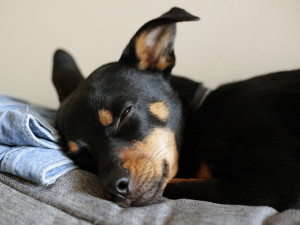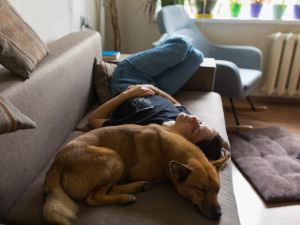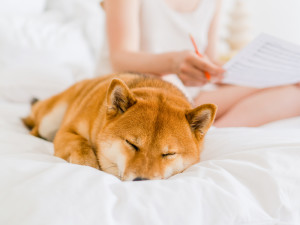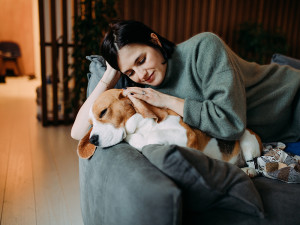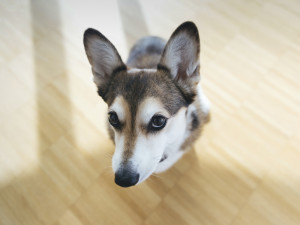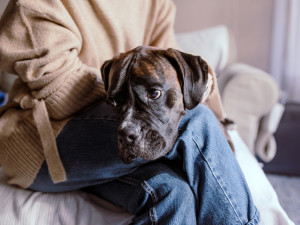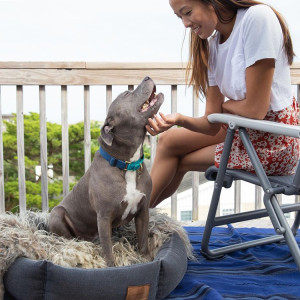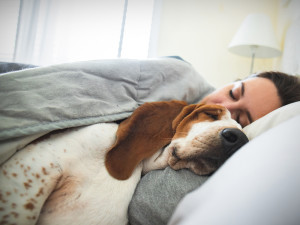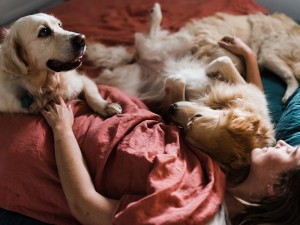Dogs Stay Up Worrying at Night Too, Study Says
It may happen more when there stressful events like fireworks.

Share Article
We humans are naturally anxious creatures. It’s the reason why people might avoid social gatherings, overthink past actions, or enjoy Phoebe Bridgers' music. I am personally burdened by a rotating set of fear-induced daily queries like, Is my dog truly happy?, Am I giving her enough exercise?, and How can I ensure she outlives me?
Sure, there are concerns beyond pet parenthood, but they’re far less crippling. And come bedtime, these feelings only intensify. It’s been somewhat reassuring, then, to discover that dogs are also kept up at night by their worried little minds. In fact, they might also stress to the extent that it impacts their quality of sleep, which actually makes me more anxious now that I think about it. Unconditional love is exhausting.
Dogs have nighttime panic, too.
This equally fascinating and upsetting discovery stems from the findings of a 2017 studyopens in new tab conducted by Hungarian researchers. A team with the Institute of Cognitive Neuroscience and Psychology at the Hungarian Academy of Sciences in Budapest examined the relationship between emotional state and sleep patterns in dogs.
They recruited 16 pups and presented them with either a positive or negative experience before sleep. Nine of the participants were male while seven were female across varying breeds. Each dog was tested twice throughout the process.
To emulate a positive experience, dogs were treated to games of fetch or tug, as well as lots of pets. The negative experiences, however, involved being left alone in a room, ignored entirely by those present, or offered threatening body language by a stranger.
So, you can add the treatment of research animals in Hungary to my extensive list of anxieties. After exposure to one of these events, the dogs were taken to a room that they were previously made familiar with for a well-earned nap of up to three hours. At this point in the study, researchers attached noninvasive (thankfully) electrodes to the pups to monitor their brain activity as they slept.
The deeper the trauma, the shallower the sleep.
On average, the researchers found that following negative experiences dogs spent 20 minutes less in deep sleep. It makes sense: Most people can struggle with sleep after a stressful day. Not to mention, if, one day, everyone I encountered either ignored me or tried to intimidate me, I’d be pretty spooked too. And the professionals seem to agree.
“There are times when dog owners report that their furry friend seems restless at night after something stressful, like a vet visit. But after a fun day of playing fetch or getting lots of cuddles, they sleep soundly and seem more relaxed,” says Iram Gladan, a PhD researcher at Utrecht University in the Netherlands and veterinarian with Breed Atlasopens in new tab.
She notes other stressors that might impact sleep include loud noises, unfamiliar environments, or negative interactions with other animals before calling out the species’ long-time nemesis. “Fireworks are known to be a major problem for all pets, especially dogs." After events like Fourth of July, she says she has noticed that many dogs sleep poorly due to the loud fireworks and other loud stressors.
Susan Nilson, trainer and founder of The Cat and Dog Houseopens in new tab, explains that emotions, like fear, anxiety, stress, or even frustration can all play a role in how pups sleep by activating a fight-or-flight response. This results in increased heart rate, blood flow to muscles, and a release of adrenaline that can mess with the animal at a chemical level.
A lot of these emotions stem from the dog feeling unsafe, so Nilson offers a simple solution most effective if rolled out early. “That’s why I always recommend that dog owners who have just adopted a dog start by creating a safe space where the dog can retreat at will to decompress, regroup, and start to relax as he learns that he is safe in this new, unfamiliar environment with new, unfamiliar people,” she says.
Negative experiences kickstart (restless) slumber.
That being said, one of the study’s unexpected discoveries was that dogs who had just endured a negative experience fell asleep faster than those following a positive one. Despite their overall quality of sleep being diminished, negative experiences appeared to wipe the animals out. Beyond that, this was also followed by roughly 10 percent longer periods of sleep. Although, again, they spent less time in deep, restful sleep, which isn’t great.
The study implies that dogs may use sleep as a protective strategy against concerns of the day, kind of like how I avoid therapy sessions with long naps. Nilson confirms that sleeping can be a coping mechanism for worried pups, but it’s only one of several displacement behaviors they often exhibit.
“So, you might see a dog engage in excess sniffing, drinking, or yes, sleeping, as a way of trying to reduce stress or tension arising from conflicting emotions or to provide an escape from an unpleasant or aversive situation,” she explains.
Gladan adds that this habit could also be a simple reaction to the exhaustion that follows high-stress situations, like someone crashing on the couch after putting in extra hours at the office. “This is similar to how humans might feel the need to nap after a particularly draining day,” she says.
And just like us, dogs need quality sleep to properly support their physical and mental health. “During sleep, a dog’s body repairs and regenerates tissues, supports immune function, and processes the day’s experiences, which is vital for learning and memory,” she adds.
Play and attention help them get a quality snooze later.
Clearly, our pups need plenty of quality sleep to function. Quite a bit of it, in fact. Per Gladan, dogs need at least 12 to 14 hours of sleep each day. Depending on their age, however, they might need even more. For example, young puppies will require more zs to support their growth in the same way older pooches need more to aid their aging bodies. A fact that this 30-something finds all too familiar.
As the study showed, physical exercise is one of the best ways to enhance our pets’ sleep. Nilson confirms as much, noting that play is a great counter to negative emotions, particularly fear, and is a useful resource to help switch dogs from a negative emotional state to a positive one.
At the same time, mental stimulation can be used to attack sleep killing anxieties at the source. “Activities like sniffing, licking, and chewing are known stress busters in dogs so they can help dogs feel more relaxed and potentially improve sleep quality,” she explains.
Gladan also emphasizes the importance of exercise, both physical and mental, when trying to boost a dog’s sleep. But, like anyone with an AI girlfriend can tell you, nothing compares to the comfort of genuine love. “Of course, spending quality time with their owners helps them feel loved and secure, reducing anxiety and promoting relaxation,” she adds.
Is your dog stressing out before passing out?
Now, I’d assume most people don’t have electrode devices at the ready to document the quality of their pet’s sleep. The best we can do is keep an eye out during the day for signs that our pups might be experiencing stress that could potentially carry over into their dreamscapes.
Nilson recommends looking for changes in posture and expression, specifically with the eyes, ears, mouth, tail, and fur. These subtle cues can include sweaty paws, yawning when not tired, panting when not hot, excessive shedding, pacing, avoiding eye contact, widening of the tongue aka spatulate tongue, or whale eye which occurs when the whites of their eyes are showing.
Gladan points to other physical signs like a tucked tail, flattened ears, or tense posture as indications your dog is stressed. Destructive behaviors, like chewing furniture, might also suggest anxiety, as well as increased vocalization like barking or whining more than usual.
Unfortunately, these actions can create a bit of a vicious cycle: Gladan warns that quality sleep is crucial to regulating a dog’s mood and reducing their stress levels. Over time, these issues will only cause them to be more anxious or irritable if ignored. New behavioral problems, a weakened immune system, and possibly shortened life are also risks of consistently limited sleep quality.
So, it’s imperative to keep your pup happy, healthy, and happily sleeping. As Gladan puts it, “After all, a dog that sleeps well wags well.”
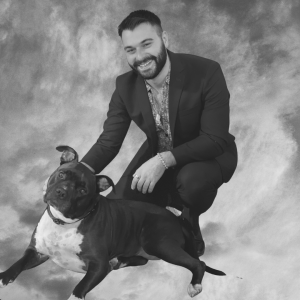
Sean Zucker
Sean Zucker is a writer whose work has been featured in Points In Case, The Daily Drunk, Posty, and WellWell. He has an adopted Pit Bull named Banshee whose work has been featured on the kitchen floor and whose behavioral issues rival his own.
Related articles
![Dog with sleep startle reflex. Woman lays on her couch and gently wakes up her dog]()
Why Does My Dog Freak Out When I Wake Them Up?
“Let sleeping dogs lie” is more than just a confusing old saying.
![A dog looking up with a cute face]()
How to Get Your Scared Dog to Trust You
Using these tips, your skittish dog will warm up to you.
![Sad boxer rests on owners lap, dog doesn't want to be touched]()
How to Tell if Your Dog Is in Pain
And what to do to help them.
![a human petting a dog on a dog bed]()
The Best Dog Beds Of 2025
Our dogs sleep with us, too. But these trainer-recommended dog beds—from indestructible ones for puppies to orthopedic options for seniors—are the next best thing.
![Woman and dog sleeping together in bed]()
Where Should Your Dog Sleep at Nighttime?
It’s a personal preference, but here are the pros and cons.
![Woman lying in bed with two golden retrievers]()
13 Reasons to Sleep With Your Dog
It’s science (and adorable).


